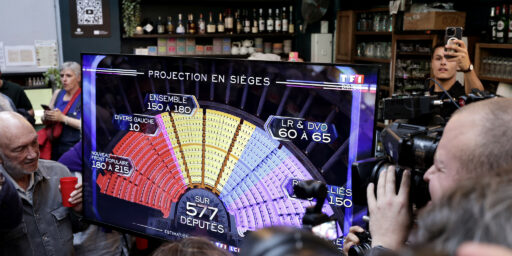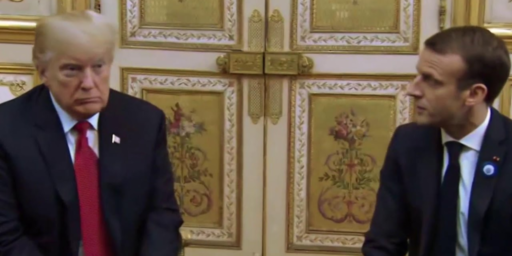Voting Underway in French Presidential Runoff
The incumbent should win easily but turnout is low and the consequences dire.

As I write this, it’s afternoon in France and the second round is well underway.
Reuters (“Macron or Le Pen: France faces stark choice for president“):
The French voted on Sunday in an election that will decide whether pro-European Union, centrist President Emmanuel Macron keeps his job or is unseated by far-right eurosceptic Marine Le Pen in what would amount to a political earthquake.
Opinion polls in recent days gave Macron a solid and slightly growing lead as analysts said Le Pen – despite her efforts to soften her image and tone down some of her National Rally party’s policies – remained unpalatable for many.
But a surprise Le Pen victory could not be ruled out. With polls showing neither candidate able to count on enough core supporters to win, much will depend on those still weighing up anxiety about the implications of a far-right presidency against anger at Macron’s record since his 2017 election.
A Le Pen victory would mark a political upheaval for Western democracies on a par with Brexit or the U.S. election of Donald Trump in 2016, ending decades of rule by mainstream French leaders and the latest threat to the future of the European Union.
Polls opened at 8 a.m. (0600 GMT) and will close at 8 p.m. (1800 GMT). Initial projections by pollsters are expected as soon as polls close.
By noon, some 26.4% of voters had cast their ballots – two points down on 2017 when final turnout was already at its lowest point for nearly half a century.
Hugo Winter, a 26-year-old salesman in Paris, said he would be among those who would not bother to cast a vote.
“I don’t see the point in choosing between two things that don’t correspond to my ideas,” Winter said as he did some morning food shopping. “We live in a parallel world. The politicians don’t represent the people.”
NYT is treating this like an old-style blog, with running updates. A recent one, “Macron and Le Pen spar in an increasingly divided France,” is telling.
An Ipsos and Sofra Steria poll for the daily newspaper Le Monde, published just before campaigning officially stopped on Friday, showed Mr. Macron leading with 56.5 percent of the vote to Ms. Le Pen’s 43.5 percent. He appears to have widened his lead, possibly decisively, during the two weeks since the first round of voting on April 10.
Still, the likelihood of a high abstention rate and the reluctance of many of the 7.7 million people who voted for Jean-Luc Mélenchon, the narrowly eliminated hard-left candidate, to switch their vote to Mr. Macron has left lingering uncertainty hanging over the result.
Mr. Mélenchon said “not one vote” for Ms. Le Pen; he did not, however, endorse Mr. Macron, who moved right during his presidency and whose aloof assurance is often perceived as arrogance.
The first round of voting showed how France has eviscerated the center-left and center-right parties that were the chief vehicles of its postwar politics. It has split into three blocs: the hard-line left, an amorphous center gathered around Mr. Macron and the extreme right of Marine Le Pen.
A makeover, involving a quieter tone and a lot of smiling, helped soften Ms. Le Pen’s image, but if the packaging is different, the content is not.
French electoral rules are arguably more democratic than ours. Most notably, there’s a nationwide popular vote rather than our bizarre Electoral College system and a requirement for a majority winner rather than the plurality winner ours allows.
Still, they’re plagued by some of the same attitudinal issues. The notion that a serious party leader can simultaneously declare “Not one vote for Le Pen” in recognition of how dangerous she would be for France and Europe and yet not endorse the flawed by sensible incumbent is bizarre. Ditto people who sit it out because neither the neo-Nazi nor the democratic centrist perfectly represent their views.
My strong guess is that Macron wins by at least ten points. But the fact that so many voters are Meh over such a stark choice, while frustrating, should no longer be surprising given where we are in American politics.






Since I am in this mode at the moment, let me say that there is nothing arguable about it: France’s rules are more democratic than ours.
@Steven L. Taylor: I think that’s right practically speaking. The second round tends to have lower turnout but it’s still reasonably representative and isn’t filtered through the bizarre prism of an electoral college. At a theoretical level, the over-centralization of power in Paris is less democratic than our federal model. Alas, in practice, most states are simply run by the crazies who vote in the primary of the dominant party.
Marcon has been reelected with 58.2% of the vote.
Far too many votes for La Pen, the establishment parties need to get their sh!t together or she may win next time
@Sleeping Dog: Or the French people — like the American people — need to get their shit together, take responsibility, and support liberal democracy over authoritarian hate, rather than blaming “the parties.”